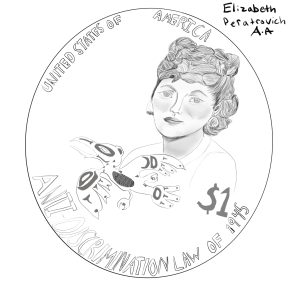24 Elizabeth Peratrovich (she/her)
By Araceli Urrutia (she/her)

Born in Petersburg, Alaska, on July 4th, 1911, Elizabeth Peratrovich an Alaskan Native from the Tlingit Nation, was adopted by Andrew and Jean Wanamaker. Peratrovich grew up in Southeast Alaska, speaking Tlingit and English. She learned the history of her people and practiced a traditional Tlingit lifestyle, picking berries and fishing salmon. Unfortunately, she and other Native people endured constant discrimination and segregation, oftentimes establishments posted signs reading, “White Trade Only” or “No Dogs, No Natives.” Fortunately for her, activism was ingrained into her life at a young age. She grew up attending meetings of the Alaska Native Brotherhood with her father, who was a charter member of the nonprofit organization formed to address racism. She continued her education at Ketchikan High School, an integrated school where she met her future husband.
In the early 1930’s, Peratrovich married Roy Peratrovich and moved to Juneau, Alaska in late 1941, where they raised their three children. After settling in Juneau, she continued the fight for equality by becoming the Grand President of the Alaska Native Sisterhood. Later that year, she read an openly racist sign on a hotel door in town and outraged citizens took it upon themselves to write to Governor Gruening. The letter was the start of her campaign to pass an anti-discrimination bill through the Territorial Legislature, with the aid of Governor Gruening.
The bill initially failed in the House by a tie vote. This only motivated Peratrovich and her husband to travel around the state urging Native Alaskans to join their fight. In 1945, the House passed the bill and ended up on the Senate floor, where it was debated for several long hours. Senator Allen Shattuck, argued the measure would “aggravate rather than allay” racial tensions, “who are these people, barely out of savagery, who want to associate with us whites with 5,000 years of recorded civilization behind us?” Peratrovich, who knit during legislative sessions, set down her knitting needles, took to the podium and said: “I would not have expected that I, who am barely out of savagery, would have to remind the gentlemen with 5,000 years of recorded civilization behind them of our Bill of Rights… No law will eliminate crimes but at least you as legislators can assert to the world that you recognize the evil of the present situation and speak your intent to help us overcome discrimination.” The crowd burst out into cheers and the 1945 Anti-Discrimination Act was passed, with votes being 11-5. The Senate had just successfully passed the United States first ever anti-discrimination law.
Peratrovich, the civil rights hero and Grand President of the Alaska Native Sisterhood, died on December 1st, 1958, at the age of 47 from breast cancer. Her immense activism is remembered through Elizabeth Peratrovich’s Day on February 16th. In February 2020, the 75th anniversary of the bill, she was honored with her own one dollar coin in commemoration of her relentless efforts in her fight for equality.

